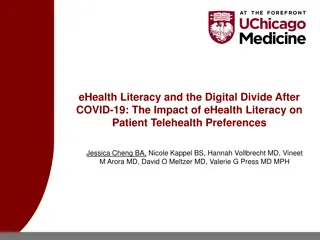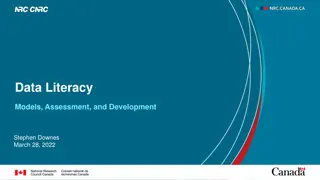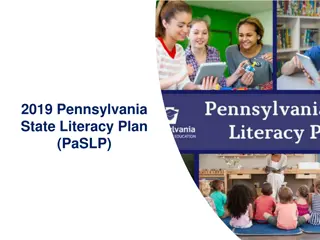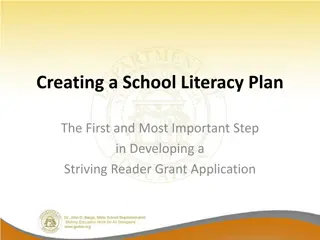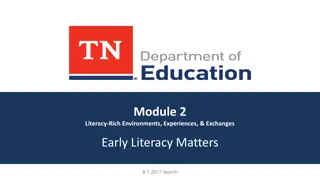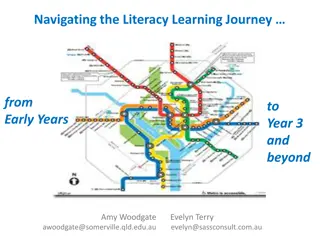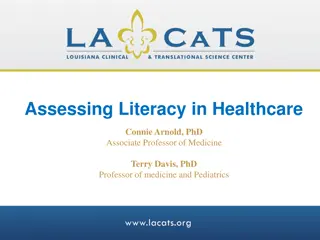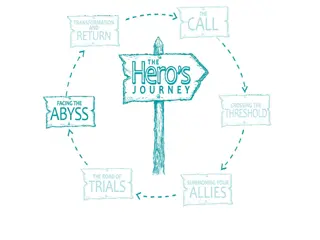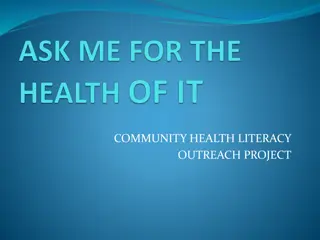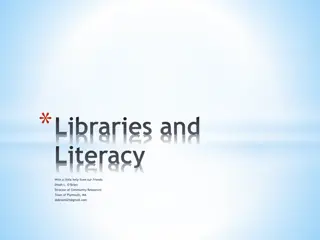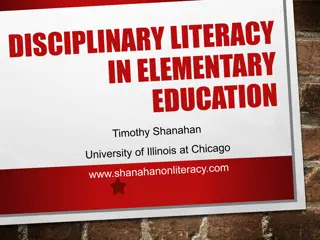Workshop Evaluation - Project READ Literacy Network
Workshop evaluation presented by Jane Tuer and Lisa McArthur from Project READ Literacy Network in June 2014. The workshop focused on introducing the LMA project to develop a screening tool, different approaches to discussing literacy with clients, how LBS programs can meet client needs, and practical application. The collaborative Labour Market Partnership Project aimed to enhance employment outcomes for lower-skilled Ontarians through the development of a new screening tool. Participants engaged in group work and role-playing scenarios to improve their techniques and approaches in employment services.
Download Presentation

Please find below an Image/Link to download the presentation.
The content on the website is provided AS IS for your information and personal use only. It may not be sold, licensed, or shared on other websites without obtaining consent from the author.If you encounter any issues during the download, it is possible that the publisher has removed the file from their server.
You are allowed to download the files provided on this website for personal or commercial use, subject to the condition that they are used lawfully. All files are the property of their respective owners.
The content on the website is provided AS IS for your information and personal use only. It may not be sold, licensed, or shared on other websites without obtaining consent from the author.
E N D
Presentation Transcript
I Just Need a Job!!! (please complete the front portion of the workshop evaluation) Presented by: Jane Tuer and Lisa McArthur, Project READ Literacy Network June 2014
Agenda To introduce our LMA project to develop a screening tool based on the needs of ES in Waterloo-Wellington Learning about different approaches to discussing literacy with clients/candidates Learning about how LBS programs can meet the needs of your clients/candidates Practice of applying what has been learned June 2014
Labour Market Partnership Project Collaborative among the 7 regional literacy networks Coordinate local services Enhance employment outcomes Lower-skilled Ontarians Project READ Develop new screening tool Field test Provide training
Client Scenario You re the experts in employment services How do you currently screen for potential referrals to literacy? Don t change what you do now Think about how you currently talk about the referral June 2014
Group Work Break into groups of 3 or 4 people One person will be the employment counsellor One person will be the client (using the scenario we give you) One or two people will be the scribes taking notes and offering suggestions June 2014
During Roleplaying What techniques/approaches work well? What concerns or fears do you have? Where does the interview start to be a struggle? What subjects are difficult to talk about? What questions are difficult to ask? When do you feel you need more information or support in order to help your client? What information should every ES worker know?
Group Work Wrap Up What did you find you were doing well? What did you find were the challenges for you? Did you have any epiphanies? June 2014
Read This Message! C u ion! Ho on to h n r il when on c w k m rg n y use only wh n va uatingbu l ng D nger! Ex osive stor ge re !
Read This Message! C u ion! Caution! Ho on to h n r il when on c w k Hold on to handrail when on catwalk m rg n y use only wh n va uatingbu l ng Emergency use only when evacuating building D nger! Ex osive stor ge re ! Danger! Explosive storage area
What Does This Mean??? Planck developed his quantum theory further and derived a universal constant, which came to be known as Planck's constant. The resulting law states that the energy of each quantum is equal to the frequency of the radiation multiplied by the universal constant: E=f*h, where h is 6.63 * 10E-34 Js. The discovery of quanta revolutionised physics, because it contradicted conventional ideas about the nature of radiation and energy.
Who is Low Literate? 6 Major Groups by size of group (largest to smallest): 1. Majority Canadian born, English mother tongue, under 45, 39% have some post-secondary education, most have high school, employed, very negative attitudes to computers 2. Majority Canadian born, English mother tongue, all ages, have some post-secondary education, 28% high school, employed, negative attitudes to computers 3. Born outside Canada, Other mother tongue, over 46, majority completed or have some high school, 82% employed, very negative to computers
Who is Low Literate? Born outside Canada, Other mother tongue but English speaking, older, little formal education, less positive attitudes to computers 4. Canadian born, English mother tongue, under 35, over have not completed high school, majority employed, positive attitudes to computers 5. Canadian born, English mother tongue, 16 25, majority completed high school, only 23% employed, very negative to computers 6. Over 6 million people and growing over next 30 years - both men and women.
What is a Screening Tool compared to an Assessment Screening Tool Brief measure to determine if an adult needs literacy interventions or not They can be pointed questionnaires Assessment More detailed measure of a potential learner s literacy strengths and weaknesses They require actual activities to measure skill levels They require an educational history interview They will also assess someone s learning style OR They can be a give and take conversation and observations June 2014
Literacy Screening Tool Section A - Questions Can your client 1. Fill in forms accurately and completely? 2. Follow-up on written or printed instructions (notes, forms or letters that you have sent or left with them)? 3. Confidently and effectively use automated telephone systems voice mail and numerical choices on the telephone key-pad? June 2014
Literacy Screening Tool Section A - Answers If your client struggles with two or more of these consistently, it may indicate literacy and numeracy issues. June 2014
Literacy Screening Tool Section B - Questions Have you noticed or observed . 1. Client asks very few questions about printed information (seemingly ignores or dismisses it or glances over it quickly and puts it away to look at it later) 2. Client asks an excessive amount of questions about printed materials especially about information that appears to be obvious to a reader June 2014
Literacy Screening Tool Section B Questions (cont d) 3. Forms or notes from the client to you are obviously completed by another person on a consistent basis 4. Restless or distracted or even frustrated during visits with you especially as you go over printed information 5. Does not show up to employment support groups that involve writing or reading June 2014
Literacy Screening Tool Section B Questions (cont d) 6. Lacks printed information in their homes and excessive TV watching 7. Consistently shows up very early or very late or not at all for appointments and does not appear to record appointments anywhere (e.g. calendar) 8. Children doing poorly in school and struggling with their literacy development (reading problems) and an unwillingness by the parent (client) to discuss it with the school June 2014
Literacy Screening Tool Section B Answers If your client demonstrates 4 or more of these behaviours, they may have literacy and numeracy issues. June 2014
Literacy Screening Tool Section C Q & A Ask your client 1. What grade were you last in (not necessarily completed)? What type of school or program/stream was it? (basic, vocational, occupational, special education, general, advanced) June 2014
Literacy Screening Tool Section C Q & A 2. What subject or areas did you do well in school? What subjects didn t you do well in? June 2014
Literacy Screening Tool Section C Q & A 3. Do you remember ever being tested for learning disabilities? Do you remember what they said as a result of the tests? 4. Were you ever away from school for a long time or a long period? (e.g. illness, suspension, etc.) Were you ever frequently kept home or you stayed home from school for whatever reasons? June 2014
What Does It Look Like? Essential Skills Level 1 - beginning
Limited Literacy Skills Essential Skills Level 1 end
Limited Literacy Skills Essential Skills Level 2
Limited Literacy Skills Essential Skills Level 2
Readiness to learn Not all clients who need skills upgrading will be ready to learn Barriers: Mental health and medication Basic Needs aren t being met (housing, food, etc.) Other i.e. feeling of being forced to be at any agency June 2014
Literacy It s a four-syllable word!!!! Has started to take on the politically incorrect connotation Illiterate is rarely used Even Essential Skills can make people think of life-skills So what do you say instead . June 2014
Upgrading Skills Upgrading GED Preparation Employment readiness training Adult Upgrading Adult Learning June 2014
Fear of School May have had a bad experience at school (and the stories become worse as the years go by) Probably didn t do well at school and felt stupid School structure didn t work June 2014
Fear of School - Solved Different game as an adult Adult learning principles are used More equality between instructor and learner Learner-centred or learner-driven Learning is only related to the adult s goal and goal path The learner can say, No! June 2014
Six Principles of Adult Learning Adults are internally motivated and self-directed Adults bring life experiences and knowledge to learning experiences Adults are goal oriented Adults are relevancy oriented Adults are practical Adult learners like to be respected June 2014
Im looking for a jobI dont have time for school Learning happens at various times and locations The client can do as little as 2 hours/week Most programs are flexible about part- time and full-time programming Upgrading can help you improve your chances of moving up in the company; more job security; increase your earning potential June 2014
Project READ Centralized assessment Centralized referral point Our job to know all the educational programs We can help to screen a client and refer by phone We can support your screening questions and concerns We can talk to your clients/candidates to help sell upgrading June 2014
Waterloo Region LBS Programs Conestoga College Core Essentials St. Louis Essential Skills Upgrading WRDSB The Literacy Group of Waterloo Region All programs provide services in K-W and Cambridge June 2014
Academic Upgrading Career Exploration Discover Your Future Focus for Change
1. College / Apprenticeship preparation Our courses are accepted for admission into college and apprenticeship programs 2. GED test preparation We prepare people for this high school equivalency test 3. Employment preparation We can help brush up reading, writing, and math skills for the workplace
Classes are set up in a self-directed format - students work individually, but one-on-one help is available Classes run from 9:00 a.m.- 2:00 p.m., Monday to Friday, but part-time schedules are possible We run continuous intake; new students start regularly throughout the year (except for summer closure in July & August) First step is an academic assessment or GED pre- test
We have two career exploration programs Discover Your Future January & April 10 weeks Everyone Focus for Change Start Date Length Eligibility September 14 weeks Women receiving OW/ ODSP These programs run from 9:00 2:00, Monday to Friday (full time attendance is a must)
There are 5 areas of study in these programs Personal Management Problem-solving skills, effective interpersonal relations 1. Career Building Assessment of personal abilities, creation of employment/training plan 2. Employment Strategies Job search, resumes, interviews, job shadow period 3. Academic Review English and math assessment and review 4. Computer Literacy Overview of Microsoft Word, Excel, PowerPoint, and email 5.
Core Essentials at St. Louis
St. Louis Adult Learning & Continuing Education Centres Helps Learners update Essential Skills for learning, work and life including: Math Writing Reading Document Use 43
St. Louis Adult Learning & Continuing Education Centres Our niche is working with learners who have identified an SSC goal path 44
St. Louis Adult Learning & Continuing Education Centres Helps Learners Prepare for: Secondary School Credit Courses 45
St. Louis Adult Learning & Continuing Education Centres Helps Learners Prepare for: PLAR Assessments 46
Offers Learners: Small Classes (10 students per instructor) Qualified instructors to help with self- directed learning Customized instruction for the skills needed for goal Reasonable timelines and pace to allow for individual differences St. Louis Adult Learning & Continuing Education Centres 47
Other Considerations: Our programs are Free Learners can attend full time or part time Transportation and childcare subsidies are available for qualifying learners St. Louis Adult Learning & Continuing Education Centres 48
St. Louis Adult Learning & Continuing Education Centres Who is Eligible: Adults aged 19 and older ESL Learners who have achieved CLB of 6 49
Core Essentials St. Louis: Kitchener Main 70 Young Street , Kitchener St. Louis: Cambridge Annex (behind St. Benedict s school) 50 Saginaw Pkwy, Cambridge St. Louis Adult Learning & Continuing Education Centres Morning Class Monday-Thursday 8:45-11:45 Afternoon Class Monday-Thursday 12:30-3:00 50
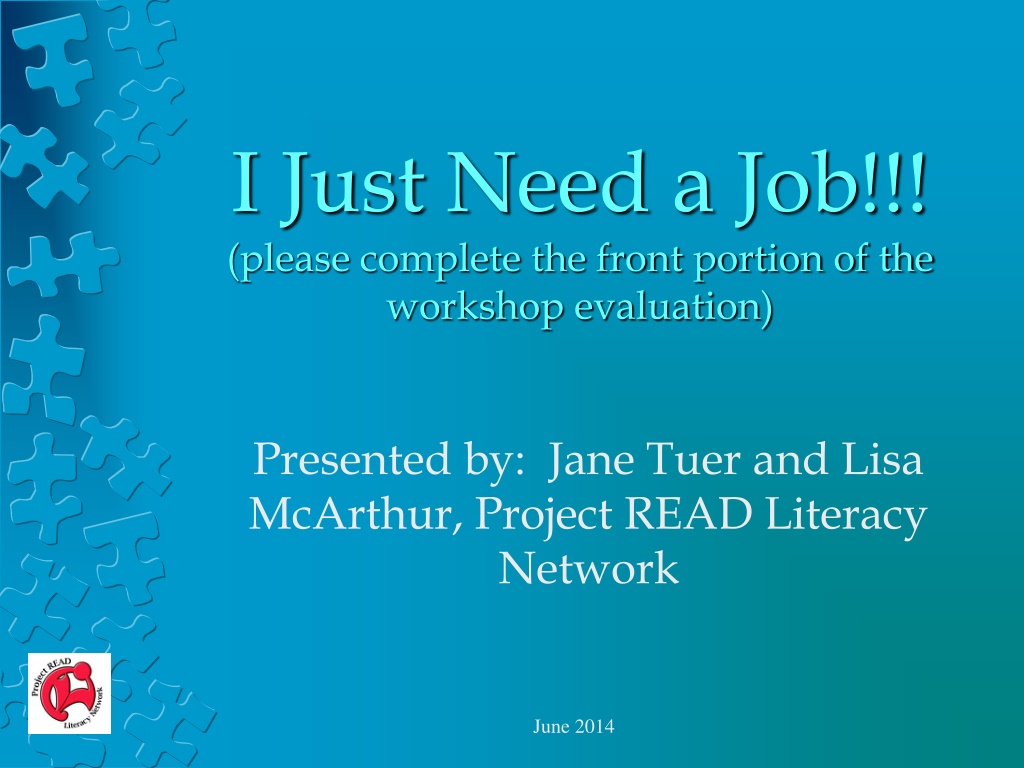
 undefined
undefined






